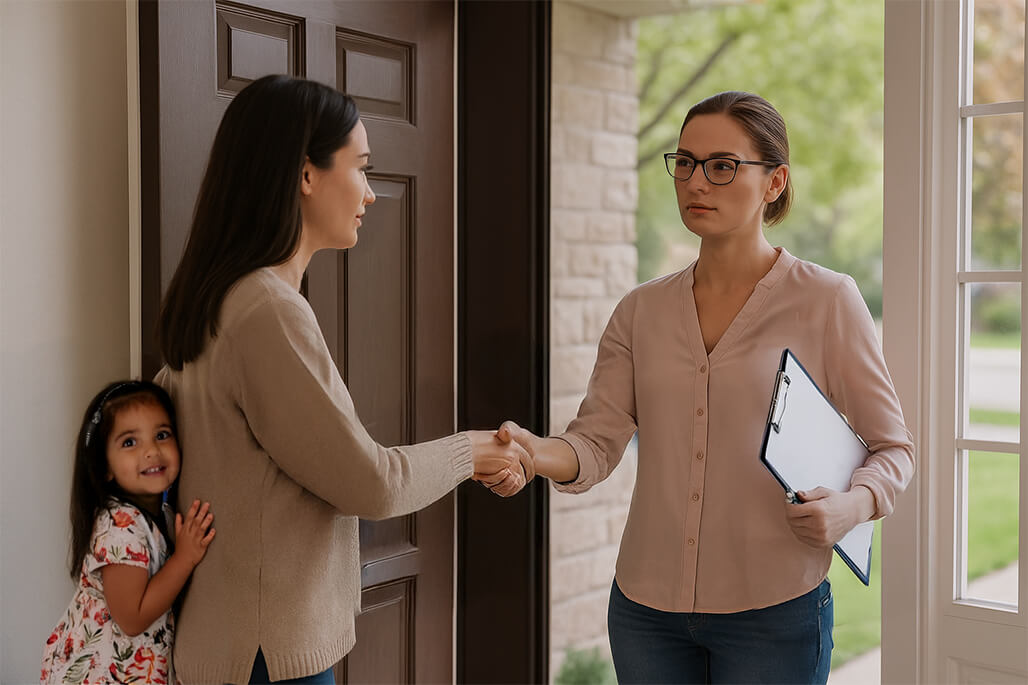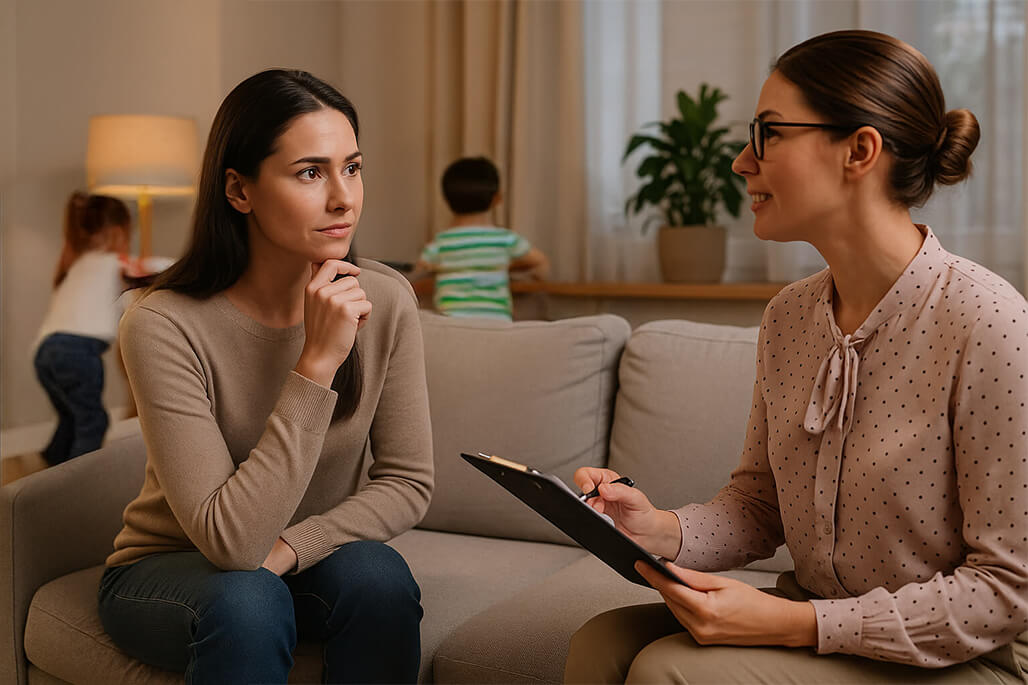There’s a knock at your door. Someone says they’re with Child Protective Services. Your heart sinks. Maybe you panic. Maybe you freeze. What are they doing here? What are they going to ask? Can they just take your kids?
Take a breath. You’re not powerless.
CPS doesn’t have the right to walk in and do whatever they want. You have legal rights, and the steps you take in those first few minutes matter.
This guide will help you stay calm, stay smart, and protect yourself and your children.
Why CPS Might Show Up
CPS doesn’t just knock on doors randomly. Someone made a report. That report may have come from:
- A school counselor or teacher
- A doctor, nurse, or ER staff
- A neighbor
- A former partner
- A relative
- An anonymous tip through a hotline
And here’s the thing – CPS is legally required to follow up. Even if the report sounds ridiculous, even if it’s based on lies, they still have to investigate.

Some of the most common reasons CPS opens an investigation include:
- Reports of neglect (no food, no supervision, dirty clothes, missed school)
- Allegations of physical abuse or unsafe discipline
- Concerns about drugs, alcohol, or mental health issues in the home
- Questions about medical care or unsanitary living conditions
But just because they’re checking into something doesn’t mean they’ve made up their mind. They’re collecting information. You need to protect yours.
What You Don’t Have to Do
You don’t have to let them inside
Unless they have a court order or there’s an emergency involving immediate danger, they can’t come in without your permission. You can step outside and speak to them at the door. Be polite, but clear:
“I’m not comfortable allowing anyone into my home without a court order or legal counsel present.”
You don’t have to answer every question
You have the right to say nothing. You can ask to speak with a lawyer first. Anything you say can be written down, quoted, or used in a report – even offhand comments you didn’t mean the way they sound.
You don’t have to sign anything
Safety plans, voluntary placement agreements, or “just for now” documents may seem harmless. They’re not. Some of them are legally binding, and they could impact your custody rights.
Say this instead:
“I’d like to review this with an attorney before signing anything.”
How to Handle the Visit
This is where staying focused really matters. Your attitude, your tone, and your choices all count.

1. Stay calm
CPS workers make notes about everything – the condition of your home, your mood, your words, how you interact with your child. If you start yelling or slam the door, they may write that down as hostility or avoidance.
Stay grounded, even if you’re angry. You’re not agreeing with them – you’re showing you’re stable and in control.
2. Ask questions
You have every right to ask:
- What is the exact allegation?
- What’s your name and ID number?
- Can I see a copy of the report? (They may say no, but ask anyway.)
- What are you planning to do next?
Take notes during the conversation. Get names, times, and details. If it’s legal in Texas and you feel comfortable doing it, you can record the conversation.
3. Don’t guess or fill in gaps
If you don’t know the answer to something, say that. If you think something’s being misunderstood, don’t try to explain in a rush. Ask to speak with a lawyer and follow up after getting advice.
What Happens After the Visit
CPS doesn’t make a decision at the door. This is usually the first step in a longer process. Depending on what they see or hear, they might:
- Close the case right away
- Schedule a follow-up visit
- Contact your child’s school or daycare
- Ask to interview your children privately
- Request drug tests, mental health evaluations, or home visits
- Recommend or push for a “safety plan” or temporary placement
- Open a formal investigation or go to court
Some of these steps can move fast. If you don’t speak with a lawyer early, it becomes harder to respond the right way later.
When to Get Legal Help
You don’t have to wait until things get worse. The moment CPS shows up, or even just calls you, is the time to get guidance.
Call an attorney if:
- You don’t understand what they’re asking
- You’re being pressured to sign anything
- You think your child might be removed
- They’ve already visited your child’s school or talked to family members
- You already have a custody or visitation issue in court
- You believe someone made a false report out of spite
The earlier a lawyer gets involved, the more options you have to protect your rights.
Mistakes to Avoid
These are common traps that can hurt your case, even if your intentions are good:
- Letting CPS in just to “clear things up”
Once you open the door, you’ve lost control of what they see and how they interpret it. - Saying too much, too fast
Trying to explain yourself under pressure can make things sound worse – or give CPS more to investigate. - Signing anything you don’t fully understand
It’s okay to say no until you’ve had legal advice. - Going silent or ignoring them
Refusing all communication can work against you. It’s better to speak through your lawyer and stay in control of the message.
Here’s a FAQ section that addresses specific, real-life situations parents might find themselves in when CPS shows up. Each question is written in a conversational tone, with clear, direct answers grounded in Texas law and practical advice.
CPS Visit FAQ: What Parents Ask in Real Situations
CPS came by while I wasn’t home and left a card. What happens if I don’t call back?
If you ignore the card, CPS may come back unannounced, possibly more than once. If they feel they aren’t getting cooperation, they could escalate the case to court and ask for an emergency order. You’re not legally required to call them back right away, but it’s smart to talk to a lawyer first, then respond through your attorney.
📌 Call a family law attorney the same day. Let them guide your next move.
My ex called CPS during our custody battle. Can they really investigate based on that?
Yes. CPS investigates report even if they’re clearly tied to custody drama. The truth will come out in time, but you still need to take it seriously. If your ex has a pattern of making false reports, that can be documented and may eventually work against them in court.
📌 Keep all communication from your ex and document anything that feels retaliatory. Tell your lawyer right away.
I failed a drug test CPS asked me to take. Can they take my kids immediately?
It depends on the situation. A failed test doesn’t always lead to removal, especially if there’s no history of harm or if your kids are safe and cared for. But CPS might ask for more testing, substance abuse treatment, or temporary supervision. Signing a safety plan without legal advice could affect your custody rights long term.
📌 Don’t sign or agree to anything else without speaking to an attorney. Get ahead of this before CPS moves toward court.
CPS wants to talk to my child at school without me there. Can I stop that?
In most cases, no. Texas law allows CPS to interview a child at school without a parent’s permission if they believe it’s necessary to protect the child or gather unbiased information. You won’t always be notified first.
📌 Contact your child’s school to ask if CPS has already visited. Then call an attorney to find out what you can request moving forward.
CPS is asking about people who live in my home. Can that affect my case?
Yes. CPS may ask about everyone in the household, even roommates, relatives, or partners. If someone living with you has a criminal record, drug history, or unresolved CPS cases, that can complicate things. It doesn’t mean they’ll automatically remove your child, but it can raise red flags.
📌 Be prepared to answer questions about who’s living in the home. Don’t lie. Talk to a lawyer about how to handle concerns before CPS draws conclusions.
They want me to sign a safety plan saying my kids will stay with my mom. Do I have to sign it?
No. You’re allowed to say you want legal advice first. These plans are not neutral documents. Signing may limit your rights or make it harder to challenge the situation later.
📌 Politely decline and say, “I’d like time to review this with an attorney.” Then call one immediately.
You’re Allowed to Stand Up for Yourself
CPS visits are difficult. No one wants to feel judged or cornered. But being calm, informed, and prepared makes a big difference.
If CPS knocks on your door, don’t guess. Don’t panic. Call someone who knows how to protect your rights and your child.
Call Brandi Wolfe Law at (210) 571-0400. We’ll walk you through what’s happening, help you respond the right way, and fight to keep your family together.

